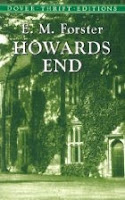 Set at the beginning of the 20th century, this novel revolves around the lives of the Miss Schlegels and the Wilcoxes. The Schlegels are a wealthy, although not exceedingly, but rather arty family who disregard many social prejudices and views of the upper classes. The Wilcoxes definitely belong to the upper class with all the trim and trappings, including the attitude of superiority over the rest of society. In rank, the families are much the same and therefore come into contact with one another frequently. There is also a mutual attraction among some of the family members which keeps the acquaintanceship going. However, their views being so different from one another often leads to much discussion and disagreement, especially with the elder son, Charles, who is most definitely a world class snob.
Set at the beginning of the 20th century, this novel revolves around the lives of the Miss Schlegels and the Wilcoxes. The Schlegels are a wealthy, although not exceedingly, but rather arty family who disregard many social prejudices and views of the upper classes. The Wilcoxes definitely belong to the upper class with all the trim and trappings, including the attitude of superiority over the rest of society. In rank, the families are much the same and therefore come into contact with one another frequently. There is also a mutual attraction among some of the family members which keeps the acquaintanceship going. However, their views being so different from one another often leads to much discussion and disagreement, especially with the elder son, Charles, who is most definitely a world class snob. Enter in the Basts who are from the lower middle class and who struggle for a living. The Schlegels, with their liberal views, desire to help them, while the Wilcox’s would prefer them to just disappear. They feel that the existence and well being of someone on such a low rung the social ladder is of no consequence to them and therefore don’t bother much, even when their advice to the young clerk turns out to be quite disastrous. They feel no responsibility for having steered them in the wrong direction and leave them to get on as best they can. The Schlegels, on the other hand, feel so responsible that they are almost desperate to help them, whether the Basts want their help or not.
This is a book about extremes in social life. The Wilcoxes on the one end and the Basts on the other. The Schlegels are in the middle and feel the need to try and bridge the gap between the two. Unfortunately, they are a little naïve as to the ways of the world and neither realize how ill-used they are by the Wilcoxes nor how their attempts are doomed to damage the Basts.
Sadly I can’t remember who it was who reviewed this and mentioned that they didn’t care for it, but whoever it was, you were right. I had been looking forward to reading this, but was quite disappointed in the end. While the premises were good, the events taking place all seemed a bit contrived, almost like a Wooster and Jeeves adventure. It’s as if Forster said, “I want to obtain this” and then fit his story around his goals instead of writing the story as it came. As a medium for discussion about social ills, it serves its purpose, but I think the story itself got in the way of this becoming a truly great book. A little less P.G. Wodehouse would have served it better.
1 comment:
Interesting. I read this about ten years ago and loved it. I also love the fantastic Emma Thompson movie. Perhaps I'm due for a reread.
Post a Comment